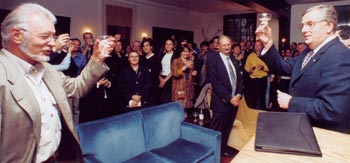Campus
honors McFadden at reception
12 Oct 2000
by
Cathy Cockrell, Public Affairs
"I'm
a little bit ambivalent about this," the co-winner of this
year's Nobel Prize in economics, Berkeley Professor Daniel
McFadden, told a large crowd of campus well-wishers at a reception
in his honor Oct. 11, the day the prize was announced.
"I've
gotten 45 calls today about choice theory," he said. "It's
the first time in 35 years."
 |
| Daniel
McFadden, left, receives a toast from Don McQuade, Vice
Chancellor of University Relations. Peg Skorpinski
photo. |
A
modest man known for his decency as well as brilliant contributions
to his field, McFadden named mentors, colleagues, students
and research assistants who had contributed to his career
- saying "no scientist works alone." When a small gift, wrapped
in Cal blue and gold, was presented, McFadden quipped that
it must be "the coveted parking pass" - a reference to the
lifetime reserved parking space that the Berkeley campus traditionally
awards its Nobelists.
Colleagues,
grad students, research assistants and office staff who work
with McFadden had words of admiration for both the mind and
the character of the man they had come to fête.
Fellow
economics faculty praised his outstanding contributions to
the College of Letters & Science's Department of Economics.
"He's
as modest as he appears and has provided so many things to
the rest of us," said Economics Professor John Quigley.
In
mid career, McFadden returned to Berkeley after an 11-year
stint at the Massachusetts Institute of Technology. Where
others typically seek the best hiring package for themselves,
Quigley said, McFadden negotiated for "a lab that was for
everybody else. That's extraordinary."
Quigley
counts himself among the beneficiaries of the world-class
econometrics lab - equipped with state-of-the-art technology
and access to vast data sets that McFadden brought to the
department and directs. "It's the way I do my research," he
said. "I have more computer power on my desk than in all of
Cambridge, Mass. five years ago."
Colleagues
in related social sciences praised the ways that McFadden's
work in economics has changed their own fields.
Henry
Brady, professor of political science and public policy and
director of Berkeley's Survey Research Center, had McFadden
as a thesis adviser at MIT. The statistical tools that McFadden
had recently developed were "an inspiration for thinking about
(social science) problems in a new way," he recalls.
Tools
McFadden developed help economists analyze how people choose
between complex alternatives in their lives and is "relevant
in a whole lot of fields where you're making choices between
a finite set of alternatives, each of which is very complex,"
Brady said. Students at the reception praised McFadden's talents
as a teacher.
"He
always takes time to explain things that you don't understand,"
said research assistant Tiago Ribeiro, while grad student
John Bluedorn said he never feels bad about himself around
McFadden "even though you know he's really brilliant."
Those
who have known the new laureate longest were likewise full
of praise. "Everybody says 'what a great mind.' Everybody
talks about his academic achievements," said econometrics
lab computer resource manager Grace Katagiri, who has worked
with McFadden for 29 years. But what stands out the most for
her, she said, is his warmth and generosity.
Only
now, after the deluge of faxes that arrived in the wake of
the big prize - inviting McFadden to events with fellow Nobel
laureates, the King of Sweden and the president of the United
States - is the significance of winning the Nobel Prize sinking
in for her.
"You
go along very flippant," Katagiri said. "I've been saying
for 20 years, Dan's gonna win the Nobel Prize anytime now."